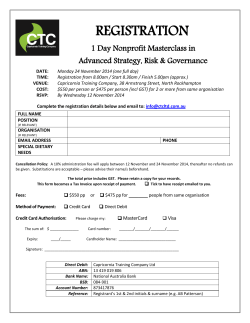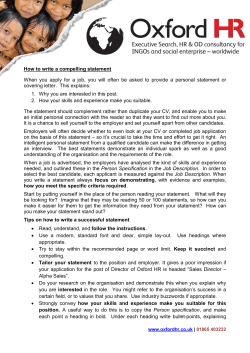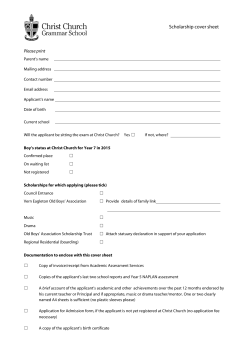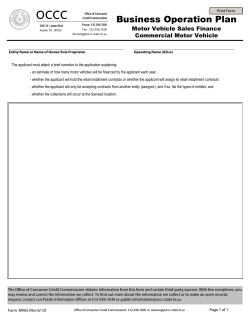
Research Facilitator for Local Government Je-S Guidance for applicants
Research Facilitator for Local Government Je-S Guidance for applicants Introduction ................................................................................................................................................ 2 Joint Electronic Submissions (Je-S)......................................................................................................... 2 Terms ........................................................................................................................................................... 3 Information for the research organisation ........................................................................................... 3 First steps for applicants .......................................................................................................................... 3 Using the Je-S system for completing your application ..................................................................... 4 Creating your application......................................................................................................................... 4 Completing your application ................................................................................................................... 5 Applicant details ...................................................................................................................................... 5 Objectives (4000 character limit) ....................................................................................................... 5 Summary (4000 character limit) .......................................................................................................... 5 Academic beneficiaries (4000 character limit) ................................................................................. 6 Staff duties (2000 character limit) ....................................................................................................... 6 Impact summary (4000 character limit) ............................................................................................ 7 Ethical information (4000 character limit) ........................................................................................ 7 Resources ................................................................................................................................................. 7 Travel and subsistence .......................................................................................................................... 8 Estates and indirect costs ..................................................................................................................... 8 Project partners ......................................................................................................................................... 8 Reviewers .................................................................................................................................................... 8 Classifications ............................................................................................................................................. 9 User involvement....................................................................................................................................... 9 Attachments (supporting documents) .................................................................................................. 9 Case for support - (maximum of two sides of A4) ........................................................................ 9 Justification of resources (maximum of two sides of A4) ........................................................... 10 Summary CV (maximum of two sides of A4) ................................................................................ 10 List of publications................................................................................................................................ 10 Head of department statement (maximum of one side of A4) .................................................. 10 Support letter from current employer (maximum of one side A4).......................................... 10 Proposal classifications ........................................................................................................................... 10 Submitting your proposal ....................................................................................................................... 10 Further enquiries ..................................................................................................................................... 11 1 Introduction This guidance is designed to assist applicants to complete their application which will need to be submitted to ESRC via the Joint Electronic Submission (Je-S) system. This guidance should be read in conjunction with the following information: • Call document and scheme-specific guidance: Research Facilitator for Local Government http://www.esrc.ac.uk/funding-and-guidance/funding-opportunities/32323/researchfacilitator-for-local-government.aspx • The Local Government Knowledge Navigator report to ESRC, LGA and SOLACE - ‘Analysis to Action’ 2014 http://www.solace.org.uk/knowledge/reports_guides/LGKN_Analysis_to_Action.pdf • ESRC Research Funding Guide www.esrc.ac.uk/RFG ESRC guidance on ‘How to write a good research grant proposal’ www.esrc.ac.uk/How-to Je-S help text is available in every page of your Je-S form, simply click on the question mark against any section (or on the word ‘Help’ in the top right hand corner of each page) Je-S Help desk (for all Je-S system enquiries) jeshelp@rcuk.ac.uk or 01793 444164 • • • Scheme-specific guidance http://www.esrc.ac.uk/funding-and-guidance/funding-opportunities/32323/researchfacilitator-for-local-government.aspx For further information contact: • Jeanine Woolley Email: jeanine.woolley@esrc.ac.uk Telephone: 01793 413031 • Natalie Jones Email: Natalie.jones@esrc.ac.uk Telephone: 01793 413026 Important: Where information and guidance issued in this document differs from the general guidance offered in these sources; you should adhere to the guidance in this document. Joint Electronic Submissions (Je-S) All proposals under this call must be completed and submitted through the Research Councils’ Joint Electronic Submissions (Je-S). To be able to do this the organisation must be registered (or self-registered for certain calls) for Je-S, and the applicants must hold Je-S accounts. 2 Proposals can be submitted by UK higher education institutions and some other independent UK research organisations who are already recognised institutions on Je-S. A list of these organisations is available from the Je-S login page. The organisation will have set up the Je-S submission process and will therefore be available within the Je-S searches. If you experience difficulties using Je-S or have questions regarding its use, helpdesk staff can be contacted Monday to Friday 9.00-17.00 UK time (excluding bank holidays and other holidays) at jeshelp@esrc.ac.uk or telephone 01793 444164. Terms “Applicant” means the individual who is being nominated to fill the post of Research Facilitator by the research organisation who is making the application to the ESRC. The applicant will be responsible for completing the application form, while the research organisation will be responsible for its submission to ESRC. “RO” means the research organisation where the Research Facilitator post will be hosted formally. “Submitter” means the office within the RO which authorises the application to be submitted to ESRC. This is normally within the RO’s finance function. Information for the research organisation Please note that the final deadline for submission of the proposal for this call is 16.00 on 13 January 2015. Proposals can be submitted before this deadline. The earliest start date that should be indicated in the application for the post of Research Facilitator is 1 May 2015. The proposal under this call must be completed and submitted through the Research Councils’ Joint Electronic Submissions (Je-S). To be able to do this both the RO and the individual applicant they include in their application must be registered for Je-S. First steps for applicants All applicants must register on Je-S so they may be included in the application by the RO. The individual applicant for this post will need a Je-S account. To get started on creating an account please refer to the Je-S System Helptext at https://jes.rcuk.ac.uk/Handbook/pages/SettingupaJeSaccount/AccessingJeS.htm Applicants need to make sure their host RO submits their application by the deadline. Please note that the final deadline for submission of the proposal to ESRC (by the submitter function within the RO) for this call is 16.00 on 13 January 2015. Applicants need to make sure their proposal is sent to the RO submitter in good time. Once the applicant completes and submits the proposal in Je-S, notification is then sent to their organisation’s ‘submitter’ to action. The ‘submitter’ is the person in that organisation authorised to approve the proposal and do the final stage of submission. Your proposal will actually be sent to Je-S/ESRC from the submitter pool at your research organisation. There is a further layer of administration between your submission of the proposal and the proposal being submitted to the ESRC, via Je-S. The research organisation’s 3 submission route usually includes both an approver (ie head of department) and submitter pool (ie central finance office). It is wholly the responsibility of the applicant and the RO to make sure they have allowed sufficient time for the submission process. We strongly advise applicants to: • Complete their application in Je-S before the final deadline (ie before 16.00 on Tuesday 13 January 2015) to allow time for their RO’s submitter to complete the submission process to the Research Councils. Applications that have begun but not completed their transfer to the Research Council by the deadline are normally rejected, • Secure confirmation from their relevant administrator that the proposal has been successfully submitted to the Research Councils (via the Je-S team) (see also ‘Tracking your proposal’). Applicants should tailor their application to show how they meet the needs of the post as shown in the call specification. For applicants employed by an organisation other than the RO making the application: Please make sure that you have clarified with your employer and the RO the steps needed to ensure your proper transfer and employment for the duration of the Research Facilitator role. Please obtain confirmation that the RO will host you for the duration of the post. Contact your Human Resources service for advice and guidance before applying with a RO. Using the Je-S system for completing your application (For reference: the Je-S system was designed primarily to provide a system for universitybased researchers to apply for grant funding for research projects. Some elements of the application process may be unfamiliar to people from non-academic backgrounds. We strongly encourage you to refer to the Je-S help text and contact the Je-S help desk if you require help in completing the application.) We also encourage you to seek advice from the research organisation’s admin/finance office for any non-technical questions. Creating your application Once you have registered on Je-S – Selecting the right call Log in to Je-S at https://je-s.rcuk.ac.uk/JeS2WebLoginSite/Login.aspx Documents screen: Select ‘New Document’ Add new document screen: Select ‘Call search’ (highlighted at top of screen). When prompted type in the call title (‘Knowledge Exchange for Local Government Project Manager’) and select from the list created. The remaining three selection fields will be automatically populated. Select the ‘Create Document’ button. 4 It is the applicant’s responsibility to ensure that the proposal document is created and submitted against the correct call (and consequently correct scheme). We will not accept proposals for processing that are not submitted using the above call route. Navigating Je-S and saving your application The initial Je-S document instructions page will give you general guidance on the navigation layout, specifically icon descriptions. The left hand column ‘Document Menu’ lists all the sections associated with this call and clearly identifies which ones are mandatory (red cross, turning to green tick when completed). Please note you may return to edit saved documents at any time. Completing your application • • • • • • Select organisation and department from drop-down lists (ie the research organisation where the Research Facilitator award will be held). ‘Your Reference’ should be supplied by your research organisation (consult your RO’s Research Office) and is a unique identifier for your application. If the RO research office does not have a system for referencing grant proposals, a suitable reference of your own choice will be acceptable. Enter Project Title (maximum limit of 150 characters). Please type in “Research Facilitator (for Local Government) [applicant name]” For Proposal Call, select Public Sector Placement Fellowships. The earliest start date should be 1 May 2015. Your grant should be a proposed duration of no more than 12 months. Applicant details Please enter the name of the individual who is applying for the post of Research Facilitator and the name of the RO making the application on their behalf. Objectives (4000 character limit) In this section, please summarise: • • Your personal profile (employment history, professional development) Your approach to the role as described in the call specification Summary (4000 character limit) In this section please copy and paste the following text: “Local government plays a substantial role in the wellbeing of economy and society in the United Kingdom. 433 local authorities in England, Northern Ireland, Scotland and Wales employ almost 1.7 million people delivering and commissioning a wide range of public services. The Economic and Social Research Council (ESRC), in partnership with the Society of Local Authority Chief Executives (SOLACE) and the Local Government Association (LGA), invites applications for the post of Research Facilitator for Local Government which is available for 12 months on a three day a week basis from 1 May 2015. Applications for this non-research 5 post will be made by applicants from eligible research organisations (which include most universities in the UK and hereafter referred to as a ‘research organisation’) eligible for UK Research Council funding. Eligible costs will be reimbursed at 100 per cent of Full Economic Costing (fEC), up to a maximum of £68,000. The overall purpose of the post will be to encourage local authority engagement with academic research by taking forward and building on the work of the Local Government Knowledge Navigator project and its action plan ‘Analysis to Action’ (http://www.solace.org.uk/knowledge/reports_guides/LGKN_Analysis_to_Action.pdf). This will include working closely with individual local authorities as well as the LGA and SOLACE as leading voices in local government to increase research use. This role has a focus on England (353 local authorities) with the partners committed to making connections with complementary initiatives elsewhere in the UK. The partners consider that this role has the potential for substantial strategic impact opportunities for research organisations and offers access to some of the most senior personnel working in local government today. Funding is secure for 12 months and the partners will be actively exploring ways to maintain the activity over the longer term.” Academic beneficiaries (4000 character limit) This project is interested to benefit non-academics and academics. In this section, please identify how your approach to the role of Research Facilitator will benefit academic communities (including researchers, teachers and managers) within and beyond the RO making the application. Please state what will be done to ensure that they benefit. Please note that this section may be published on Research Council websites and used in Research Council promotions. Please ensure confidential information is not included in this section. For further detailed guidance please access the helptext page linked to this Je-S section. Staff duties (2000 character limit) Please note: Applicants have an additional opportunity to describe their suitability for the post in the section ‘Case for Support’. In this section, you will need to state basic information about your current employment status and that you have the support of your current employer for this application. Please state whether you are: Employed: • Full or part time and how long you have occupied your current role • Name of your employer • The nature of your current job • Confirm that your current employer (either the RO making the application or other employer) has agreed that you may be released to fulfil this role if your application is successful • Current salary range. Not employed: 6 • • Your current employment status Confirm that the RO making the application is willing to host you if the application is successful. Please indicate who from the RO will be acting as the applicant’s mentor. Also indicate the principal contact details. Impact summary (4000 character limit) The post has considerable potential to create positive outcomes for a range of partners in the local government sector. The partners, with the support of the Local Government Knowledge Navigator project (2013-2014), have identified how relationships between local authorities and academic research can be developed for mutual benefit and identified some activities that have already taken place (see Analysis to Action and accompanying documents). Please state what you will do to maximise the positive impact of this role in the local government sector. Please note that this section may be published on Research Council websites and used in Research Council promotions. Please ensure confidential information is not included in this section. For further detailed guidance please access the helptext page linked to this Je-S section. Ethical information (4000 character limit) Please identify what you consider to be the main ethical issues that could arise in this project and how you would address these. The ESRC’s Framework for Research Ethics (www.esrc.ac.uk/ResearchEthics) contains a full explanation of the ESRC’s approach. Resources Where applicants and the RO state the level of resources required from ESRC The ESRC can make up to £68,000 available to ROs for this post, at 100 per cent full economic costs. ROs may request resources towards the following items of expenditure: • • • Justified Research Facilitator salary, national insurance and pension contributions Justified travel and subsistence (subject to the conditions set out in the section Travel and Subsistence below) Indirect costs appropriate to a placement into a non-academic organisation. Estates costs should not be claimed for the period of the placement. See estates and indirect costs for more information. As the post will be located at the offices of the Society of Local Authority Chief Executives (SOLACE) in central London and the partners have allocated a budget to support the activities of the Facilitator (minimum of £20,000), to cover: 7 • Project specific consumables, conferences, events, networking, cost of generating non-academic outputs, consultancy fees and equipment costing less than £10,000. The RO may offer to include additional resources to extend the partners’ budget if they so wish. Travel and subsistence ROs may not include the costs of the applicant commuting to and from the normal place of work (SOLACE offices) in their proposal. Please calculate the resources required to meet the justified travel and subsistence costs of the Facilitator. We recommend that the overall request of resources for travel and subsistence should not exceed £3,000. Estates and indirect costs Estate and indirect costs are specific to each research organisation, and do not require justification in your case for support. Estate costs may include building and premises costs, basic services and utilities, and any clerical staff and equipment maintenance or operational costs that have not been included under other cost headings. They will be calculated by a research organisation and a single figure will be required at time of application. Where an individual will be working away from the Research Organisation on long-term secondment for a period in excess of six months during the project, estates costs should not be charged for the period of secondment as in the case with this post. No reduction should be made for shorter term absence. Research organisations that have implemented the TRAC costing methodology and have passed the Quality Assurance process should apply their own estate and indirect costs. Non-research organisations that are not required to implement TRAC must have a robust costing methodology in place that has been validated in order to apply their own estates and indirect cost rates. The standard default rates should be used where research organisations have not yet developed their own rates. Your Research Office will be able to assist with this section. System validation requires a figure to be entered against estates and indirect costs – please enter the figure 0 (zero). Project partners Please indicate if the RO has secured a commitment from another organisation, funding body or funding stream over and above the organisation employing the individual to provide additional resources for this project in this section. Please indicate if the support is in kind or actual funding. A letter from the partner organisation confirming the level of support specific to this proposal should be included as an attachment. Reviewers Please disregard this section of the Je-S. All applications will be assessed by a panel representing the ESRC, LGA and SOLACE. 8 Classifications Please identify whether the project will involve significant collaborative contributions from colleagues outside of the UK. If ‘yes’ please expand within the ‘Case for Support’ attachment. User involvement Please tick all the boxes listed (this is for Research Council monitoring purposes only). Attachments (supporting documents) The following are mandatory Je-S attachments and you must include them with your application: • Case for support: why you are suitable for this role (maximum of two pages) • Justification of resources: why you require the level of funding requested (maximum of two pages) • Summary CV for the applicant (maximum of two pages) • Letter confirming that the RO will accommodate the applicant in the role if successful • Letter of support from current employer for the applicant to join the RO • Letters of support from any project partners when prompted It is important that applicants only submit the attachments specified in the list above with the application. We reserve the right to reject applications that do not include the required attachments or include attachments not specified in this guidance. Attachments should be uploaded in PDF (rather than Word) format, to reduce document corruption issues. If you are unclear about whether you can include a specific attachment please contact jeanine.woolley@esrc.ac.uk for advice, as unrequested attachments can hinder the processing of your application. ESRC reserves the right to return or reject applications that include attachments not permitted on this call. Case for support - (maximum of two sides of A4) This is where you will describe why you have applied for this post, and your suitability for the role of Research Facilitator. Please reference the role purpose, duties and person specification described in the call specification. Please outline how your skills, knowledge and experience meet the person specification for this role. Please state how you will measure your success and positive impact in the role, if successful. Please state in your proposal how you will support the learning, development and capacity building of academic and non-academic beneficiaries if you were successful in the role. Please briefly state the mentoring, management, training and development arrangements made with the RO here as stipulated in the call specification (Management and mentoring and Training and development activity). 9 Justification of resources (maximum of two sides of A4) A two-side A4 statement justifying that the resources requested are appropriate to undertake the facilitator post. The justification of resources should explain why the resources requested are appropriate for the post, taking into account the nature and complexity of the role. It should not be simply a list of the resources required, as this is already given in the Je-S form. Where you do not provide explanation for an item that requires justification, it will be cut from any grant made. Please refer to the joint Research Council Je-S helptext http://jes.rcuk.ac.uk/Handbook/pages/GuidanceonCompletingaStandardG/CaseforSupportandAttach ments/ESRCSpecificRequirements.htm for further guidance. Summary CV (maximum of two sides of A4) A summary CV for the applicant. This should include contact details, qualifications (including class and subject), posts held. List of publications List any publications if referenced in the case of support. Head of department statement (maximum of one side of A4) This refers to the RO support letter. Mandatory: The head of department, or office, at the RO must complete a statement confirming that the applicant would be accepted into the role and will be released from existing duties if already employed within the RO. The letter needs to be on headed paper, dated within the last six months and signed by the head of department who is agreeing to host the applicant. Support letter from current employer (maximum of one side A4) Mandatory: If you are not currently employed by the RO that is making the application to ESRC, please provide a letter from your current employer on headed paper, dated within the last six months and signed by the head of department confirming that they will release you to take up this role if successful. Proposal classifications In order for us to track if proposals submitted advance Social Science and Knowledge Exchange we would suggest that you classify this proposal to inform areas of Social Policy or Political Studies. Submitting your proposal After all required sections have been completed, the submit button will appear across the top menu bar. Please ensure that you have completed all the necessary attachments that are required for this specific call. The submit button will route your finalised proposal to “submitter” within the RO (as explained in the Registration section above). 10 Further enquiries Enquiries relating to ESRC research funding rules and proposal procedures should be addressed to: • Jeanine Woolley Email: jeanine.woolley@esrc.ac.uk Telephone: 01793 413031 Enquiries relating to technical aspects of the Je-S form should be addressed to: • Je-S helpdesk Email: jeshelp@rcuk.ac.uk Telephone: 01793 444164 11
© Copyright 2025













